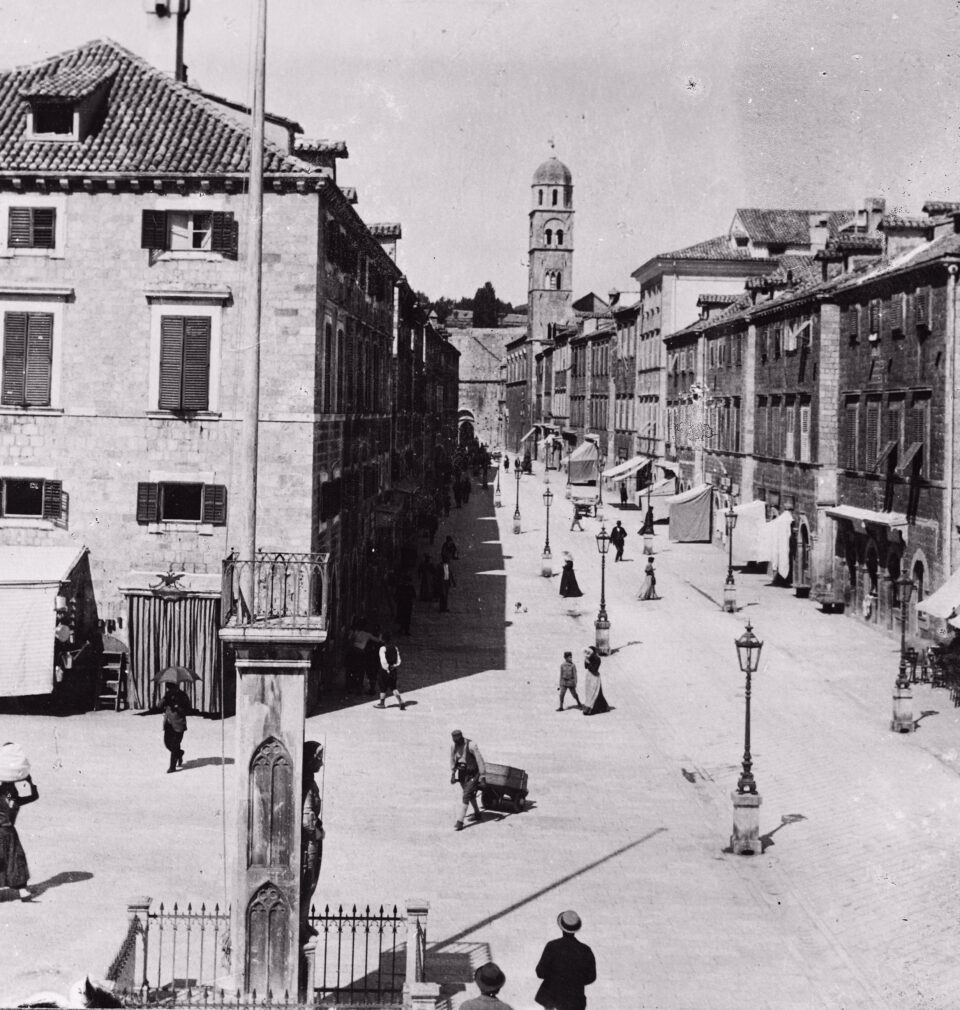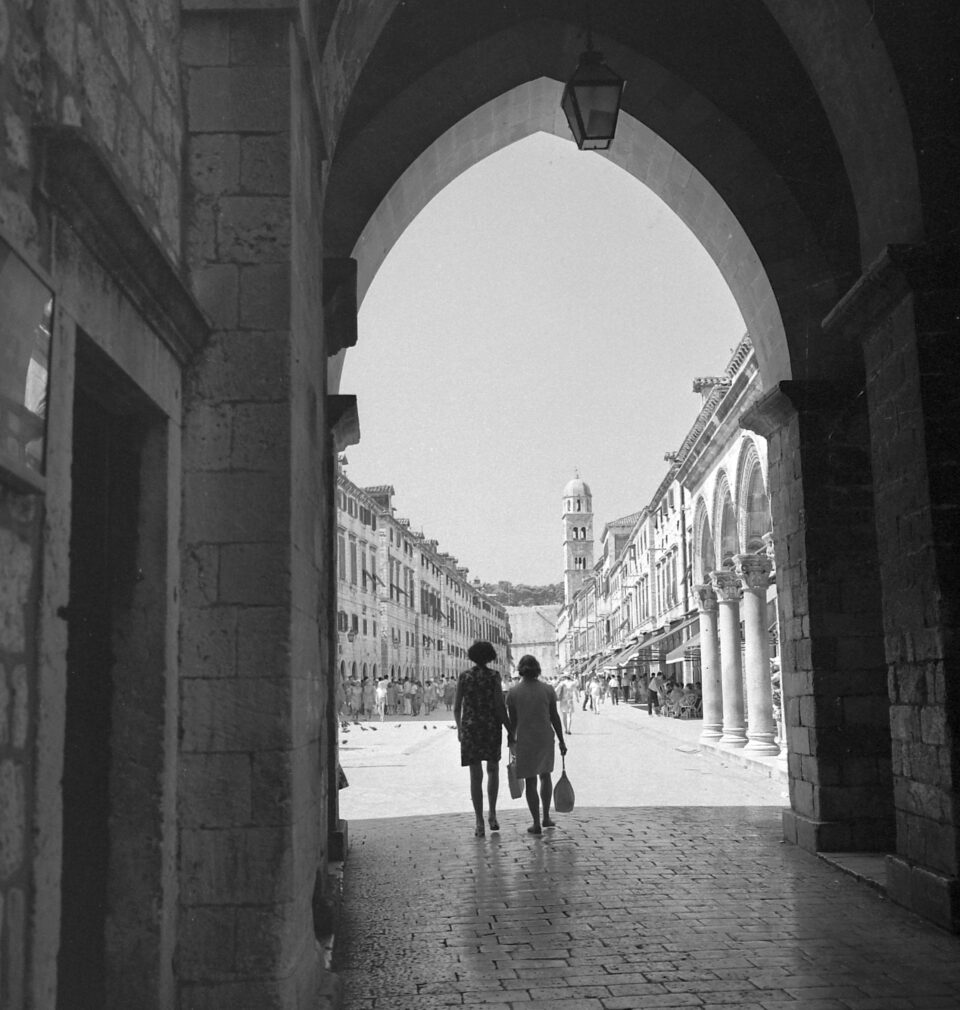
Croatia in Europe
The Spirit of Europe in the Renaissance Culture of Poland, Croatia and Dalmatia
Publication: 14 October 2021
TAGS FOR THE ARTICLE
TO THE LIST OF ARTICLESIf by some stroke of fortune the present-day residents of the Western Balkans were to have as much sympathy for each other as their elites traditionally had for Poland and its culture, the Balkans would be a region of peace, cooperation and relative prosperity, far removed from the traumatic experiences of war and the unresolved problems of the turbulent 20th century. Most of the states that were created out of the republics of the former Yugoslavian federation have attitudes towards the Republic of Poland (each of them naturally different, appropriate to their historical experience) that one could only wish they had towards each other. The roots of these relations are anchored in the Early Modern Age, and thus the subject of this article will be the Renaissance context of early – in this case – Croatian Polonophilism and its echoes in the Poland of the day.
Knowledge of Croatian history in contemporary Polish culture is at best perfunctory. We have to accept that any attempt to explain in a few words the most significant themes in the cultural past of Croatia – our platform for consideration of Renaissance culture in the comparative context – can only be an exceptionally thankless task (unless our readers are experts in the subject). For now, all we can do in bona fide is wait patiently for new publications to fill the painfully large hole in the area of interpretation of the immensely rich Polish-Croatian cultural (and other) relations from the High Middle Ages to the end of the Early Modern Age. One problem that is evident at first glance is the marked difference in political status between the Kingdom of Poland, which was one of the most influential institutions of the Renaissance, and the Regnum Dalmatiae et Croatiae contemporary to it, which in legal terms was part of the Crown of St. Stephen in the north and the Republic of Venice in the south. The continuity of the institutions of the ban as royal representative – viceroy – and the Croatian noble sabor determined both the political status of the region, which was ravaged in the 15th century by the Ottoman invaders, and the programme to reconquer the lands taken by the Turks and to unite Dalmatia and Croatia as a single political entity. The conception for the defence of the country and its later union is reflected in the writings of Croatian humanists from Dubrovnik in the south to Ozalj and Zagreb in the north. Many of these humanists left evidence of their work in Krakow, the Central European cultural and political centre of the day, which under the influence of the Jagiellons’ carefully crafted strategy extended Polish influences across an area that stretched from the Baltic in the north to the Adriatic in the south and the Black Sea in the east of Europe.
By the turn of the 15th and 16th centuries it had become tradition for Croatian nobles and patricians from Dalmatia to spend time in Krakow. Their cooperation with the Polish elite was not restricted solely to the contacts between humanists and admiration for classical culture that were characteristic for the age, but was expressed in their participation in creating Polish cultural strategy and affirming the Polish raison d’état in contacts with the political powers of the contemporary Europe. Royal chancellor Maciej Drzewicki, for instance, praised Bernardinus Gallellus (or Gall) of Zadar (a collaborator of Piotr Tomicki, secretary to Cardinal Fryderyk Jagiellończyk and later King Zygmunt the Old) for his Slavic political orientation. Nota bene, the prose version of the epitaph that Gallellus dedicated to Callimachus (the original record is in the Dominican Church in Krakow) includes a formula referencing the Crown that was highly untypical for other contemporary European realms – REGIE DOMUS ATQUE HUIUS REIPUBLICE. Its noteworthiness lies in the fact that Gallellus – significantly – uses the expression Respublica rather than Regnum, thus defining not only his own vision of the political character of the Polish state. It was Joanna Rapacka who first noted that the use of res publica was by no means coincidental here, but an “echo of the discussion of the humanist elites on the concept of the state”, while regia domus underscores the respect due the ruling dynasty in Poland[1]. The political ideas postulating a republican system thus did not arrive in Poland solely from Italy, but also from Dalmatia. The belief that in Dalmatia itself only Italian influences came to bear would be mistaken, in view of the cultural and political tradition in the communes (city-states) of Dalmatia, whose system, like the civitas in the Middle Ages, still featured attributes typical of the ancient polis, visible above all in the rights and liberties of the political elites of power in the Dubrovnik Republic.
Ideas from the south of Europe, Rapacka says, regarding visions of state, nation, history and historiography, diligently edited in the strategy of the Polish court chancellery (with the considerable input of professors from the Krakow Academy, where over several decades hundreds of noble scions from war-torn Croatia studied) and contextualised in Polish political practice, returned to the south transformed to play a momentous role in the formation of Croatian historiography and political thought in the 16th and 17th centuries. The course set by Prince Fryderyk, Bernardinus Gallellus and Jan Łaski the Elder was later continued under the auspices of King Zygmunt I the Elder by Chancellor Piotr Tomicki, Maciej of Miechów, Vinko Pribojević of Hvar, the young Jan Dantyszek of Gdańsk (Danzig), Toma Niger of Split, Fran Tranquillus Andronicus of Trogir[2], and Andrzej Krzycki (these are, of course, but a few figures from the Polish and Croatian traditions), all of whom worked closely with each other and with several other humanists from Dalmatia and Croatia.
In our thinking on this age we must take note of the following fact: humanism, both its Polish and Croatian variants, drew much of its vital strength from Italian cultural patterns, but nevertheless in the ideological sense remained within the orbit of humanitas septentrionalis and of Erasmus of Rotterdam. It was not only Erasmus’ Christian humanism that was influential in this respect but also his political vision of the ideal European ruler. For in addition to the Croatian humanists’ praise of the Polish rulers documented in the sources, Erasmus himself in his laudations singled out from among all Europe’s rulers Zygmunt the Old as the ideal king who personified the virtues of sapientia et fortitudo. Reverberating through the works of Andronicus, who was a friend and fellow reveller of Erasmus, are echoes of the philosophical epic poem by a Polish eulogist of King Zygmunt and admirer of Erasmus, the diplomat Jan Dantyszek (later a guardian of Erasmus), whose solemn praise of his king is an expression of his patriotism. Before we discuss Andronicus’ treatise, then, we should at least glance at Dantyszek’s poem, specifically that part of it that constitutes the paean of King Zygmunt. The poem recounts the struggle between Fortune and Virtue (in which the latter is naturally victorious), and the place of honour in the gallery of kings, presenting Virtue, is occupied by Zygmunt I. This king of Poland towers over the other kings in his noble, awe-inspiring gravity, valour and might; on his triumphal return from vanquished Moscow he holds in his powerful hand symbols of victory, and the blaze of his power reaches the stars[3].
After the example of Dantyszek, the young Andronicus included in his own paean of Jan Łaski topoi and motifs characteristic of various parts of the poem lauding King Zygmunt, while in a philosophical and political treatise he wrote as an older man, Ad optimates Polonos admonitio (publ. Krakow 1545), he laid out the salient principles of contemporary and, more especially, later Polish political philosophy. In his profile of the political situation of Slavdom, he highlighted its tragic condition in light of the conquests as a contrast to the situation in the Kingdom of Poland. “The Slavic nation,” as Andronicus defined it, had once been famed for the glory of its kings; the whole world had admired its achievements, it had been the terror of neighbouring peoples, but at present it was divided and subordinated to foreign dynasties – only gens Polona was ruled by a just and moderate monarch. Andronicus also stressed that the Ruthenes, who were united with the Poles, were happily not at risk of any danger thanks to just government[4]. Further on in the work, the orator holds up the liberty in Poland and the quality of its political system above all the other political formations on the Old Continent. And for that reason – and this is a significant point in his discourse – the Poles should take on the responsibility for the fate of Christianitatis, in other words, for Europe. His rhetorical persuasion thus postulates the unquestioned superiority of the Polish political system and the invincibility of the Polish army. He does draw attention to the potential hazard inherent in the reinforcement of the political oligarchy, but in his comparison with other European realms he praises the strengths of Polish parliamentary discussion and respect for royalty. He says that discussion between expert opponents usually produces decisions of salutary force for the state, because incompetent judgements and statements by individual deputies are corrected by the serious deliberations of the parliament as a whole. He thus avers that the ancestors of the Polish szlachta must have been of outstanding sagacity given that they safeguarded for such a long time the future security of the Realm by neither bestowing absolute power on the king nor permitting the abolition of the monarchy[5].
In Andronicus’ treatise, as in the writings of many humanists, both Croatian and Polish (to mention but Andrzej Frycz Modrzewski and his opponent Stanisław Orzechowski among the latter), looking into the past, at tradition, involved – apparently paradoxically – looking into the future, since it was on tradition that the ideas issuing from the framework of the contemporary political thought dominant in other regions of Europe were based. Andronicus’ ideas, like the Polish political system, were clearly at odds with the prevailing trend in Europe towards reinforcing absolute monarchic power. Such ideas did not become current in Europe until several centuries later, and only then after bloody political revolutions.
There are several important things to remember about the above thoughts on Polish and Croatian humanism. Above all, in terms of literature in the strict sense of the word, Renaissance humanism properly understood is most characteristic for Italy and South Central Europe, from the Adriatic to the Polish Baltic, although with the difference between these two areas being that the work of writers in Slavia Romana evinces Erasmian moods. While one should in no way deprecate the contemporary culture of the rest of Europe or inflate the significance of Polish and Croatian Renaissance humanism (which would be an unjustified and absurd discourse), it is an undeniable fact that in the German lands, France, and England, not to mention Denmark and the other Scandinavian states, the type of literature that was emerging at this time and in this measure from Dalmatia to Krakow did not come into being until the mid-16th century or even later. Moreover, we know how Erasmus was treated in his own lifetime in France, which was probably partly still scholastic, and how the Protestant ideologists spun a negative image of him. We also know what kind of treatment humanists there could expect for their world view, which was on the whole tolerated in the Polish Commonwealth. Suffice it in such a brief overview to mention just one of the most tragic cases: the fate of Erasmus’ close friend Thomas More
Krakow in this period, by contrast, thanks to the broad spectrum of interests of the diplomats and humanists who spent time there, gives the impression of being a synthesis of Europe. Names we should mention in this context, from the best known, include: Filippo Buonaccorsi from Italy, Konrad Celtis from Germany, Wawrzyniec Korwin from Środa Śląska, the Krakow professor Paweł of Krosno, Jan of Wiślica, Jan Dantyszek, Mikołaj Hussowski, the circle of Piotr Tomicki and Andrzej Krzycki… and a whole bevy of humanists from Dalmatia and Croatia – the abovementioned Toma Niger and Tranquillus Andronicus, and later also others, including Stefan Brodarić, Antonius Verantius[6] and his retinue… to Leonard Cox from England[7]. This is by no means an exhaustive list of significant names, of course. Naturally, such an atmosphere had to be conducive to new ideological and political developments, and these we find in the works of the Polish and Croatian humanists written in this period. These works also testify to the fairly plentiful literary output in Latin – although not only Latin, if we also take into consideration the numerous works by Croatian humanists in their vernacular tongue.
It is important to remember, however, that owing to the ideological limitations of the recent past (in both the Polish and Croatian cases), literature in Latin was for a long time treated as “non-national” and as a largely banal imitation of the antique, and hence of a lower aesthetic standard than literature in vernacular languages. Particularly after a more careful reading of these Latin texts, this is revealed to be a perception that has little in common with the reality. More recent studies are gradually discovering these early literary forms. Moreover, as I mentioned above, the stereotypical image of Europe during those times is changing. The stereotype formulated and reinforced in European literary traditions in the 19th century by the contemporary political situation imposed the view of the cultural “backwardness” of the region known as Slavia Romana in relation to the European west. This valuation of cultures that were then peripheral became – and remains – the unquestioned criterion, carrying forward with it, along with its unjust and methodologically unjustified approach, the attributes of its original historical context. It is high time we took period sources as a starting point for reconsidering the grounds for our received modes of valuing the culture which emerged in Europe in the Early Modern Age.
Croatian humanism may be said to be based formally on the Italian model, but in view of the historical conditions and the sense of kinship it was focused in ideological terms on the North, drawing if not its vital force at least its inspiration from the contemporary seat of Polish political power, i.e. Krakow. Polish state sovereignty undoubtedly impressed visitors from the Slavic South seeking a strong alliance for potential Dalmatian-Croatian reintegration into a single political entity, something to which Andronicus, after Marulić, referred indirectly in his speech. The system in the republic of the nobility, praised also in later times by Croatian historiographers and poets, was proudly underscored not only in Polish political treatises and historiosophic prose writings but also in many other works of the nascent Polish poetry genre. In a slightly later period than the first half of the 16th century outlined here, Jan Kochanowski, in his response to Philippe Desportes’ lampoon of Poland (written after the flight of Henri Valois), adopted a lofty tone to air his views on “the flighty Gaul”, while stressing, like those before him, the superiority of the Polish political system over the absolute monarchy system. The Poles, Kochanowski says, call their land Sarmatia; this is a country that respects the honour of both its guests and its unknown visitors, a country that in the spirit of its former customs cannot bear tyrants, ergo absolute power[8]. Thus a sense of honour and of human dignity as a principle of humanism – dignitas humana – resounds throughout Kochanowski’s work, corresponding with his proud sense of belonging to the grand Sarmatian realm, a European cultural and political model exalted over other contemporary political formations by Polish and Croatian humanists alike. That Polish golden liberty, aurea libertas, let it be said to round up this unintended paean of the Polish Renaissance humanism that was so attractive to humanists from the Slavic South, became, with all its inherent contradictions, a permanent feature of the cultural history of Renaissance Europe.
***
[1] See Joanna Rapacka, “Bernardinus Gallellus iz Zadra”, pp. 45–66, in: Eadem, Zaljubljen u vilu, Split 1998.
[2] Toma Niger (1450–1531) from Split, bishop of Skradin and Trogir, humanist and diplomat, advisor and secretary to Ban P. Berislavić of Croatia, and papal nuncio in Krakow. Vinko Pribojević (Vincentius Priboevius, ca 1450–1532) from Hvar, a Dominican and historiographer, author of the treatise De origine succesibusque Slavorum (On the origin and glory of the Slavs). Fran Tranquillus Andronicus (Andronicus Tranquillus Pathenius, 1490–1571), a humanist from Trogir, orator, poet and author of numerous prose writings.
[3] In the Latin text: “Quos vero aurato cernis diademate claros, / Hos inter noster rex modo maior adest. / Multus excellit procero corpore, vultu / Illustri, forti pectore corde, manu. / Rettulit a domitis modo quae victricia Moscis, / Signa gerit, victor notus ad astra potens. […] Joannes Dantiscus, DE VIRTUTIS ET FORTUNAE DIFFERENTIA SOMNIUM”.
[4] In the Latin text: “…quae plurimis suis regibus et Dynastis gloriabatur, cuius res gestae per orbem celebrantur, quae terrori finitimis populis erat; nunc miserabiliter, varieque distracta, pars his, pars aliis dominis paret, praeter gentem Polonam […] quae moderato mansuetoque Regum imperio regitur. […] Cum Ruthenis feliciter actum est, quod se cum Polonis coniunxerunt: nam et sub iustis legitimisque imperiis citra metum iniuriae”, c. 32, 33.
[5] In the Latin text: “Quoniam in consultationibus, ubi deliberatur a plurimis, qui se profitentur communium commodorum defensores, raro quidem accidit, quin eventus salutares consequantur. Nam pravitas et imbecille iudicium paucorum, quando eos contingit aberrare a formula recti officii, bonitate plurium, et gravitate consilii corrigitur. Satis autem vel ex eo iudicare possumus, vestros quidem maiores multum sapientiae praestitisse, quod in longa tempora, etsi mutationes rerum humanarum paterentur, in sempiternum incolumitati suae prospexerint, nec integram regibus potestatem permittendo, nec abrogando regiam authoritatem”, c. 41, 42.
[6] Stefan Brodarić (Stephanus Brodericus, 1480–1539), scion of a venerable Croatian noble line, diplomat, humanist and bishop; Antonius Vrančić (Antonius Verantius or Vrantius, 1504–1573), Croatian nobleman from Sibenik, poet, humanist, secretary to Jan Zapolya, King of Hungary, diplomat, and primate of the Kingdom of Hungary. Both published their writings in Krakow.
[7] In the name of scholarly accuracy it would be more precise to say that this eulogist of the Krakow Academy and author of the first textbook on rhetoric in England, was a Welshman. See Andrew Breeze, Jacqueline Glomski, “An Early British Treatise Upon Education: Leonard Cox’s De Erudienda Iuventute (1526)”, Humanistica Lovaniensia: Journal of Neo-Latin Studies 1991, vol. 40, pp. 112–167.
[8] In the Latin text: “Et tamen hanc poteras mecum reqiescere noctem, / Nec dubiis vitam comittere, Galle, tenebris. / State viri: quae causa fugae? […] / Sarmatia est, quam Galle fugis, fidissima tellus / Hospitibus: fastus tantum impatiensque Tyranni / Sarmatia est, cui verba prius, nunc terga dedisti”, Jan Kochanowski, Gallo crocitanti A`Moibe` (Francuzowi kroczącemu odpowiedź, 1576).
Copyright © Herito 2020



